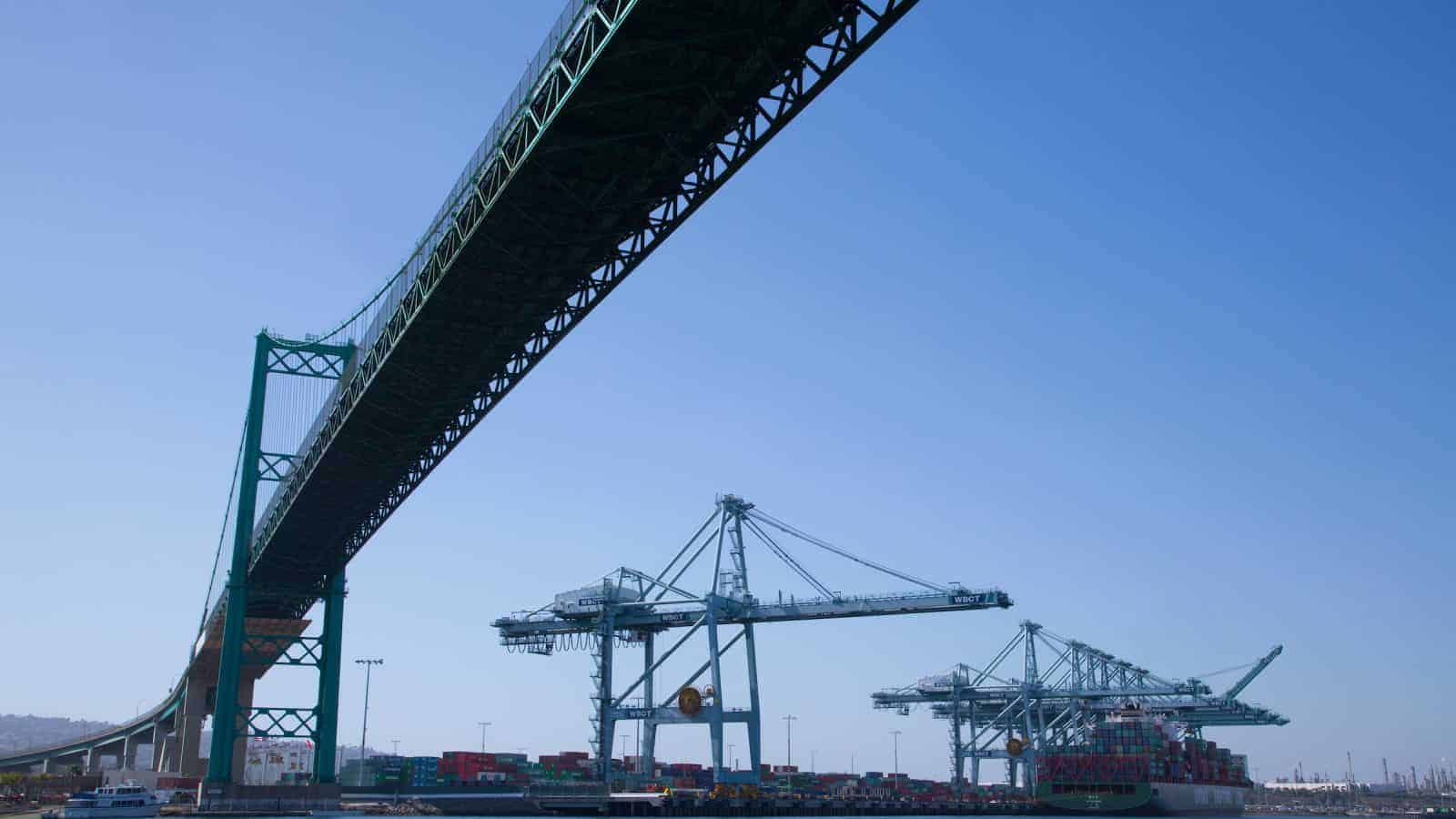Fix the Broken Permitting Process, NAM Tells Congress
A continuous regulatory onslaught is hamstringing the permitting process for U.S. energy and infrastructure projects—and thus reducing manufacturing competitiveness and harming the U.S. economy, NAM Vice President of Energy & Resources Policy Brandon Farris told Congress on Tuesday.
What’s going on: By consolidating and cleaning up our infrastructure permitting regulations, the U.S. can advance multiple top policy priorities, Farris said at “The Next Fifty Years of the Clean Water Act: Examining the Law and Infrastructure Project Completion,” a hearing of the House Committee on Transportation & Infrastructure’s Subcommittee on Water Resources and Environment.
- “Streamlining and modernizing our nation’s permitting laws and procedures will help us advance many of our nation’s shared priorities, improving the quality of life for all communities; modernizing our infrastructure; achieving energy security; ramping up critical mineral production; enhancing manufacturing competitiveness and creating manufacturing jobs in the U.S.,” Farris said. “These are goals that all Americans can support.”
Why the wait? Current wait times for the approval of critical manufacturing facilities, roads, bridges and more are needlessly lengthy, and they’re forcing business overseas, Farris continued.
- “Why should we settle for a permitting process that can take 10 or 15 years to approve essential projects?” he asked, adding that in Australia, a country with similar environmental protections, approvals take about two to three years.
- One manufacturer of critical raw materials for semiconductors recently told the NAM that “because of the regulatory uncertainty in obtaining a Clean Water Act section 402 permit in a timely manner . . . they are going to build a facility in the E.U.” instead of the U.S.
Steps to success: Manufacturers are urging legislators to take several actions to rectify the broken system. These are:
- Consolidate permitting processes—with enforceable deadlines—for the siting of new energy projects and their infrastructure;
- Speed up the approval process for transportation-infrastructure projects;
- Commit to developing our resources to strengthen U.S. supply chains for the critical minerals vital to national security;
- Ensure that the Biden administration follows congressional intent on all streamlining efforts, including the One Federal Decision, a Transportation Department approach that seeks to expedite certain federal environmental reviews.
The last word: “Permitting reform will help us achieve more—more manufacturing, more domestic energy production, more inputs and raw materials and more jobs,” Farris concluded. “And our country and the world will be better off if we and our allies do not depend on our authoritarian rivals for energy and other natural resources.”
U.S. LNG Exports Set to Skyrocket by 2050

U.S. natural gas production is likely to keep growing through 2050, while LNG exports will take off, according to new forecasts from the Energy Information Association.
The gist: Natural gas production is predicted to increase 15%, while LNG exports will skyrocket 152% between last year and 2050, according to the EIA’s “Annual Energy Outlook 2023.”
- “Production growth is largely driven by U.S. LNG exports, which we expect to rise to 10 [trillion cubic feet] by 2050,” an EIA blog post explains.
Where it’s happening: “Natural gas production growth on the Gulf Coast and in the Southwest reflects increased activity in the Haynesville Formation and Permian Basin, which are close to infrastructure connecting natural gas supply to growing LNG export facilities.”
- “New liquefaction facilities in Louisiana became fully operational in 2022, ahead of schedule. In addition, new LNG trains in Texas are scheduled to be online by 2025.”
How they figured it out: This projection comes from the “reference case” in the outlook report for 2023.
- “We use different scenarios, called cases, to understand how varying assumptions affect energy trends. The AEO2023 Reference case, which serves as a baseline, or benchmark, reflects laws and regulations adopted through mid-November 2022, including the Inflation Reduction Act,” according to the EIA blog.
Permitting Reform Would Unlock U.S. Potential, NAM tells Congress
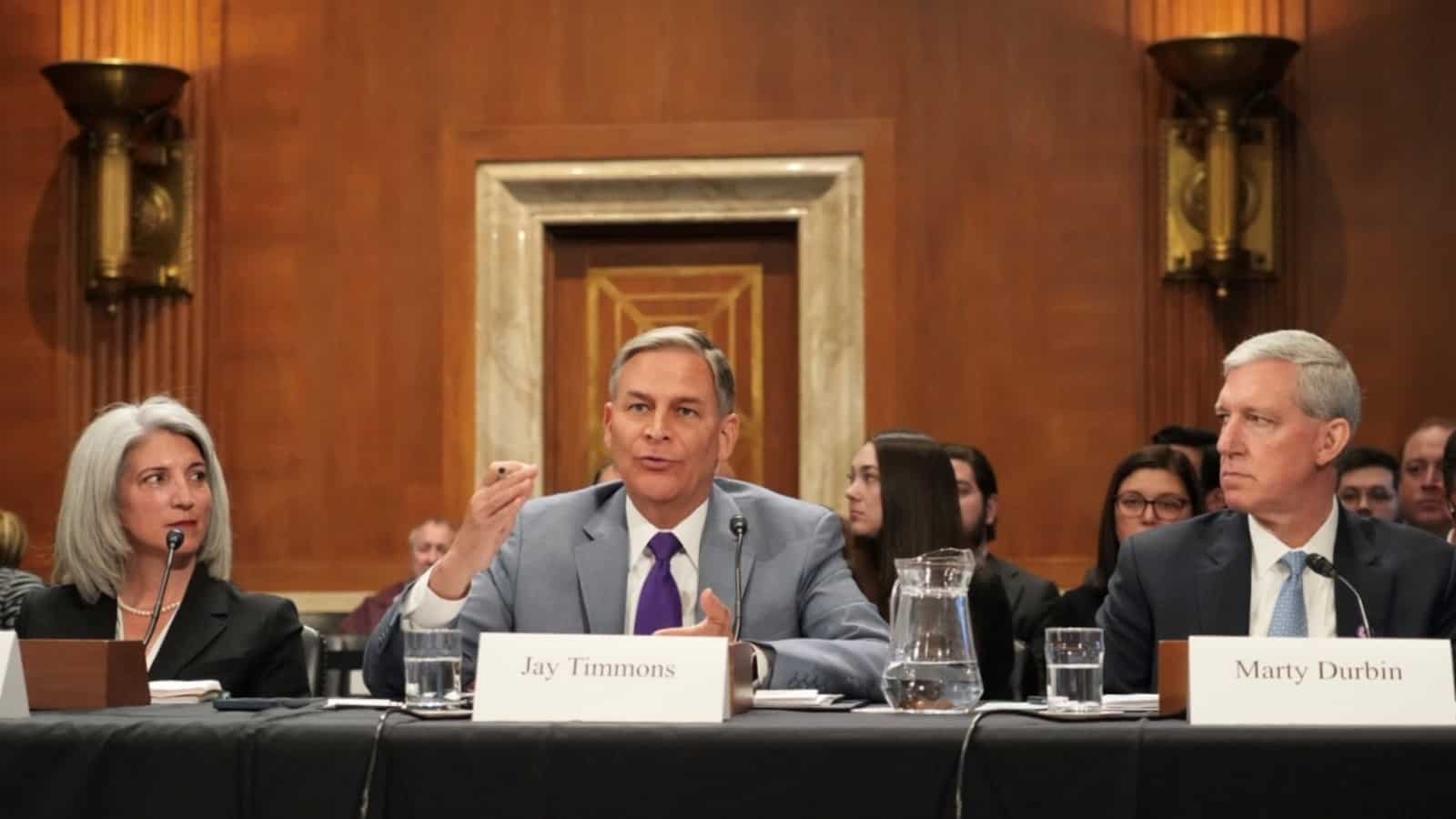
Reforming the permitting process for infrastructure projects could raise standards of living in America, unlock the full potential of ambitious recent legislation and make us less dependent on hostile foreign nations—all while making manufacturing in the U.S. more competitive, NAM President and CEO Jay Timmons told lawmakers yesterday.
What’s going on: Timmons gave testimony at “Opportunities to Improve Project Reviews for a Cleaner and Stronger Economy,” a hearing of the U.S. Senate Committee on Environment and Public Works, where he stressed the need to fix the needlessly time-consuming, complex permitting system.
- “For manufacturers, permitting reform is essential for our ability to compete in the global economy,” he said. “If we want more critical minerals for chip manufacturing, more domestic energy development and transport . . . more manufacturing facilities and jobs back home, better highways, bridges, airports [and] waterways, then we need permitting reform to make them a reality in the near future.”
Cut the wait: There is no reason for projects to take a decade or more to get approval, Timmons said.
- “If Washington could streamline the process—like manufacturers do in our businesses every single day—we could do more for this country,” Timmons continued, citing a White House Council on Environmental Quality report which found that environmental impact statements take an average of four-and-a-half years to complete.
- Timmons noted that in the case of one project, permits “from the U.S. Army Corps of Engineers were delayed a year due to the failure of the U.S. Fish and Wildlife Service to complete a required informal consultation under the Endangered Species Act.”
What to do: Timmons urged senators to work together to realize the following manufacturing priorities for permitting reform:
- Consolidated permitting processes with enforceable deadlines
- Fast approvals for transportation infrastructure projects
- A commitment to developing homegrown critical resources
- A moratorium on federal-agency regulations prior to the implementation of current standards
- Congressional assurance that lawmakers will hold the administration to recent and future statutory streamlining efforts
Protecting our values: Leaner, more efficient permitting and a commitment to sustainability and other American values can go hand in hand—and that’s exactly what manufacturers want, according to Timmons.
- “Manufacturers have a deep commitment to environmental stewardship, and we do not believe corners should be cut,” he said. “We believe in protecting our community, our neighbors and our environment. Reform is about . . . ensuring that this country—a democracy rooted in free enterprise—isn’t outpaced or outflanked or overtaken by nations that don’t share our values, don’t respect the environment or don’t recognize the dignity of human rights.”
Permitting Reform Would Unlock U.S. Potential, NAM tells Congress

Reforming the permitting process for infrastructure projects could raise standards of living in America, unlock the full potential of ambitious recent legislation and make us less dependent on hostile foreign nations—all while making manufacturing in the U.S. more competitive, NAM President and CEO Jay Timmons told lawmakers yesterday.
What’s going on: Timmons gave testimony at “Opportunities to Improve Project Reviews for a Cleaner and Stronger Economy,” a hearing of the U.S. Senate Committee on Environment and Public Works, where he stressed the need to fix the needlessly time-consuming, complex permitting system.
- “For manufacturers, permitting reform is essential for our ability to compete in the global economy,” he said. “If we want more critical minerals for chip manufacturing, more domestic energy development and transport . . . more manufacturing facilities and jobs back home, better highways, bridges, airports [and] waterways, then we need permitting reform to make them a reality in the near future.”
Cut the wait: There is no reason for projects to take a decade or more to get approval, Timmons said.
- “If Washington could streamline the process—like manufacturers do in our businesses every single day—we could do more for this country,” Timmons continued, citing a White House Council on Environmental Quality report which found that environmental impact statements take an average of four-and-a-half years to complete.
- Timmons noted that in the case of one project, permits “from the U.S. Army Corps of Engineers were delayed a year due to the failure of the U.S. Fish and Wildlife Service to complete a required informal consultation under the Endangered Species Act.”
What to do: Timmons urged senators to work together to realize the following manufacturing priorities for permitting reform:
- Consolidated permitting processes with enforceable deadlines
- Fast approvals for transportation infrastructure projects
- A commitment to developing homegrown critical resources
- A moratorium on federal-agency regulations prior to the implementation of current standards
- Congressional assurance that lawmakers will hold the administration to recent and future statutory streamlining efforts
Protecting our values: Leaner, more efficient permitting and a commitment to sustainability and other American values can go hand in hand—and that’s exactly what manufacturers want, according to Timmons.
- “Manufacturers have a deep commitment to environmental stewardship, and we do not believe corners should be cut,” he said. “We believe in protecting our community, our neighbors and our environment. Reform is about . . . ensuring that this country—a democracy rooted in free enterprise—isn’t outpaced or outflanked or overtaken by nations that don’t share our values, don’t respect the environment or don’t recognize the dignity of human rights.”
NAM in the news: Bloomberg Law previewed Wednesday’s Senate hearing and wrote about it afterward.
- The offices of Sens. Shelley Moore Capito (R-WV), Kevin Kramer (R-ND) and Cynthia Lummis (R-WY) highlighted Timmons’ Senate testimony following the hearing.
Timmons Meets With Leaders in Brussels and Paris

The NAM wrapped up its “Competing to Win” Tour in Europe with key meetings in Brussels and Paris, cementing important partnerships and building consensus on the imperative to strengthen U.S. alliances with European nations. It also advocated policies that will enable manufacturers to withstand geopolitical risks and threats to global stability.
Brussels power meetings: In Brussels, the epicenter of EU political activity, NAM President and CEO Jay Timmons met with a who’s who of experts deeply involved in trade and economic policy. He touched on a wide range of priorities including free trade agreements, permitting reform in the United States, IP, energy security and regulatory certainty.
- Timmons met with top trade policy leaders in the EU, including Tomas Baert, a trade adviser to European Commissioner Ursula von der Leyen, and Member of European Parliament and Chairman of the Trade Committee Bernd Lange.
- The team also met with BusinessEurope, led by Director General Markus Beyrer and Deputy Director General Luisa Santos, and participated in a roundtable organized by BDI Brussels Head of Office Heiko Willems. The roundtable also included some of BDI’s leading German member companies.
Evening event: The finale of the day in Brussels was a reception co-hosted by NAM Council of Manufacturing Associations member Distilled Spirits Council at the residence of U.S. Ambassador to the EU Mark Gitenstein.
- Timmons and NAM Vice President for International Economic Affairs Ken Monahan discussed the U.S.-EU relationship and the NAM’s priorities with key EU leaders on trade, including European Parliament members Reinhard Hans Bütikofer and Radek Sikorski.
French connection: In France, Timmons met with the ardent champion of manufacturing Benoit Bazin, chief executive officer of Saint-Gobain, one of the world’s largest building materials companies and the manufacturer of innovative material solutions. In North America, Saint-Gobain has approximately 150 locations and more than 15,000 employees.
- The NAM also visited AmCham France. Managing director Eglé de Richemont said following the meeting: “Today, AmCham France had the privilege to welcome three top representatives from the [NAM] to discuss over key themes, including the importance of close economic partnership between the U.S. and France, the criticality of resilient manufacturing in the U.S., France and across Europe and the importance for manufacturers of standing with Ukraine now and tomorrow for the rebuilding of the country.”
The final word: After meeting with other manufacturers on the final leg of his tour, Timmons remarked “We’ve been hard-charging now for almost two weeks, and it’s truly inspiring how unified our partners across the Atlantic are in their solidarity with Ukraine and in meeting this moment with not just talk but also action. We’re just getting started.”
Manufacturers: Permitting Reform Boosts Our Competitiveness
Timmons: Amid global threats, bill reduces our dependence on bad actors and ensures we can support our allies
Washington, DC – In advance of today’s scheduled vote in the U.S. House of Representatives on H.R. 1, the Lower Energy Costs Act, National Association of Manufacturers President and CEO Jay Timmons released the following statement:
“America’s economy, our institutions and our values are being challenged by threats from around the world, which means now is the time to strengthen our energy security and expand domestic manufacturing—both to reduce our dependence on bad actors and to ensure we can support our allies. This bipartisan action to modernize permitting reform would help us achieve these goals by speeding up critical energy, infrastructure and manufacturing investments while we continue our commitment to environmental stewardship,” said Timmons. “I am in Europe right now, witnessing firsthand the consequences of being overly reliant on a country like Russia for energy. In the 21st century, there’s no excuse for letting job-creating projects languish for years to get bureaucratic approval. The Lower Energy Costs Act will bolster manufacturers’ competitiveness in America while also bringing relief to American families and businesses. We thank Speaker McCarthy, Majority Leader Scalise and Majority Whip Emmer for designating this bill as their top priority and for their focus on ensuring our industry can continue providing the leadership our country and our world need.”
Background: In the NAM’s latest Manufacturers’ Outlook Survey, more than 74% of respondents said that permitting reform—which would simplify and speed up the approval process for new projects—would be helpful to their manufacturing company, allowing them to hire more workers, expand their business or increase wages and benefits.
-NAM-
The National Association of Manufacturers is the largest manufacturing association in the United States, representing small and large manufacturers in every industrial sector and in all 50 states. Manufacturing employs nearly 13 million men and women, contributes $2.81 trillion to the U.S. economy annually and accounts for 55% of private-sector research and development. The NAM is the powerful voice of the manufacturing community and the leading advocate for a policy agenda that helps manufacturers compete in the global economy and create jobs across the United States. For more information about the NAM or to follow us on Twitter and Facebook, please visit www.nam.org
Manufacturers Push Back on Harmful EPA Air Proposal
Washington, D.C. – Following the National Association of Manufacturers comment submission to the Environmental Protection Agency on its proposed rule to impose more stringent National Ambient Air Quality Standards for Particulate Matter 2.5., NAM Director of Energy and Resources Policy Chris Morris released the following statement:
“Improving air quality in the U.S. is a key priority for manufacturers, which is why they have invested heavily in new processes and technologies that have made manufacturing cleaner and more sustainable than ever. These efforts have contributed to the U.S. successfully achieving some of the lowest levels of exposure to PM 2.5 globally, including lower PM 2.5 levels than France, Germany, Japan and the U.K.
“The EPA’s proposal would significantly increase the number of industrial centers and population hubs in nonattainment areas. That could halt new investment, stop operations in some circumstances and cost jobs.
“Significantly, the NAM’s Outlook Survey for the first quarter of 2023 found that more than 55 percent of manufacturers anticipate the new standard would raise their cost of compliance, and one out of three manufacturers anticipate that the new standards would lead to increased permitting challenges and restrict investment and facility expansion plans.
“The NAM urges EPA to maintain the existing standard as its proposal will hinder domestic manufacturing growth, does not adequately assess the economic and job consequences or identify feasible steps to achieve attainment with new standards.”
-NAM-
The National Association of Manufacturers is the largest manufacturing association in the United States, representing small and large manufacturers in every industrial sector and in all 50 states. Manufacturing employs nearly 13 million men and women, contributes $2.81 trillion to the U.S. economy annually and accounts for 55% of private-sector research and development. The NAM is the powerful voice of the manufacturing community and the leading advocate for a policy agenda that helps manufacturers compete in the global economy and create jobs across the United States. For more information about the NAM or to follow us on Twitter and Facebook, please visit www.nam.org.
The NAM Revives High-Level U.S.–U.K. Talks
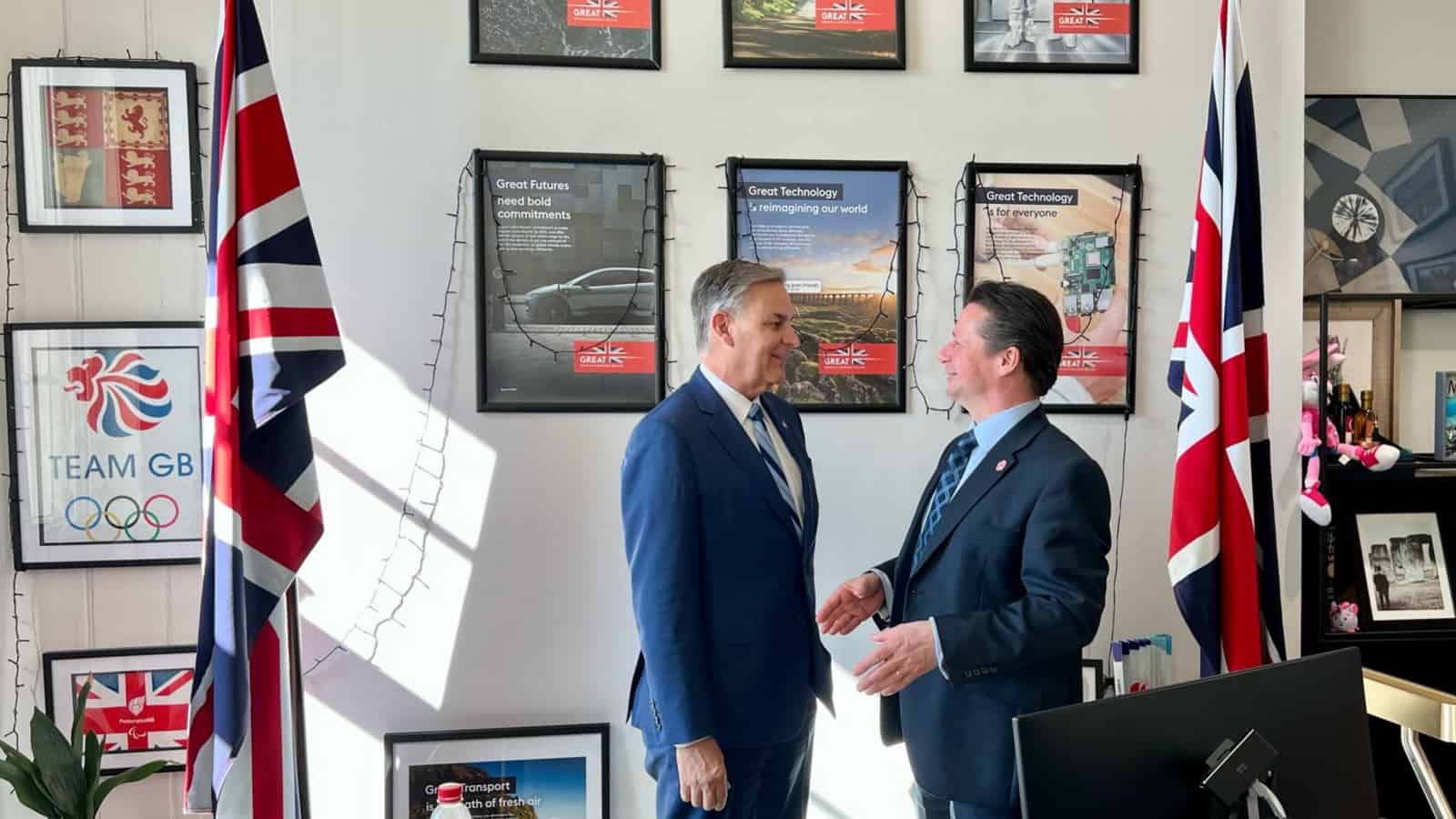
The NAM’s Competing to Win Tour in Europe moved on to London early this week, highlighting the imperative to shore up the U.S.–U.K. relationship—and to urgently address other barriers, like permitting reform and workforce shortages, to enable the U.S. to help allies in the face of Russian aggression and other geopolitical threats.
The issue: Russia’s unprovoked war in Ukraine, the aftermath of the worldwide pandemic and China’s quest for global leadership create a new urgency for expanded trade opportunities between democratic countries.
- The U.S. and the U.K. must work together to shore up supply chains, enhance energy security, boost resiliency and create growth, as NAM President and CEO Jay Timmons emphasized.
The details: Timmons crisscrossed London on Monday and Tuesday, promoting the manufacturing industry and reinforcing its priorities with senior government ministers and officials, including:
- Nigel Huddleston MP, the U.K. minister of state for international trade
- Jonathan Reynolds, Labour Party shadow business secretary (one of the architects of the Labour Party’s industrial plan)
- Jane Hartley, U.S. Ambassador to the Court of St. James’s
Support at home: During his visit, Timmons did an interview with CNN International to discuss the NAM’s new Outlook survey, which found that 77% of manufacturers want to see more trade agreements with Europe.
Making industry connections: At the NAM’s sister organization Make UK, Timmons joined a roundtable with CEO Stephen Phipson and addressed some of Britain’s leading manufacturing companies.
- He spoke about how the U.S. and the U.K. can unlock new trading opportunities going forward and bolster democracy by strengthening commerce.
- The two groups also reaffirmed their commitment to share market intelligence, data and policy work, as well as to facilitate visits for economic delegations promoting trade, investment and commercial opportunities.
- They also voiced their continued and mutual support of the Ukrainian people and of the democratic institutions in their own countries.
What they said: “The ties between the UK and United States go back a long way and we have significant political, economic and trade connections,” said Phipson. “Relations with the US are vital and its market is the second most important for UK goods. In a post-Brexit world, it is likely to assume ever greater importance as part of our efforts to boost global trade.”
- “As world events have made abundantly clear, strengthening democracy, the free enterprise system and strategic alliances in our countries and around the world is essential to our future and the fight against tyranny,” said Timmons. “As the U.S. and the U.K. take steps to build a stronger, more open and secure economic relationship, the NAM urges our leaders to move toward a new U.S.–U.K. market-opening trade agreement that includes strong, clear and enforceable outcomes.”
Meeting manufacturers: In addition, Timmons met with manufacturers that have operations or pending operations in both the U.K. and the U.S. Energy security and regulatory certainty, as well as the worker shortage in the industry, also took center stage in these discussions.
Bottom line: “The tour’s time in London matters to manufacturers in the United States because it strengthens the ‘special relationship’ between the U.S. and the U.K. and boosts the prospects for enhanced cross-Atlantic trade, supporting manufacturing jobs in both countries,” said Ken Monahan, NAM Vice President of International
Timmons Finishes First Week in Europe
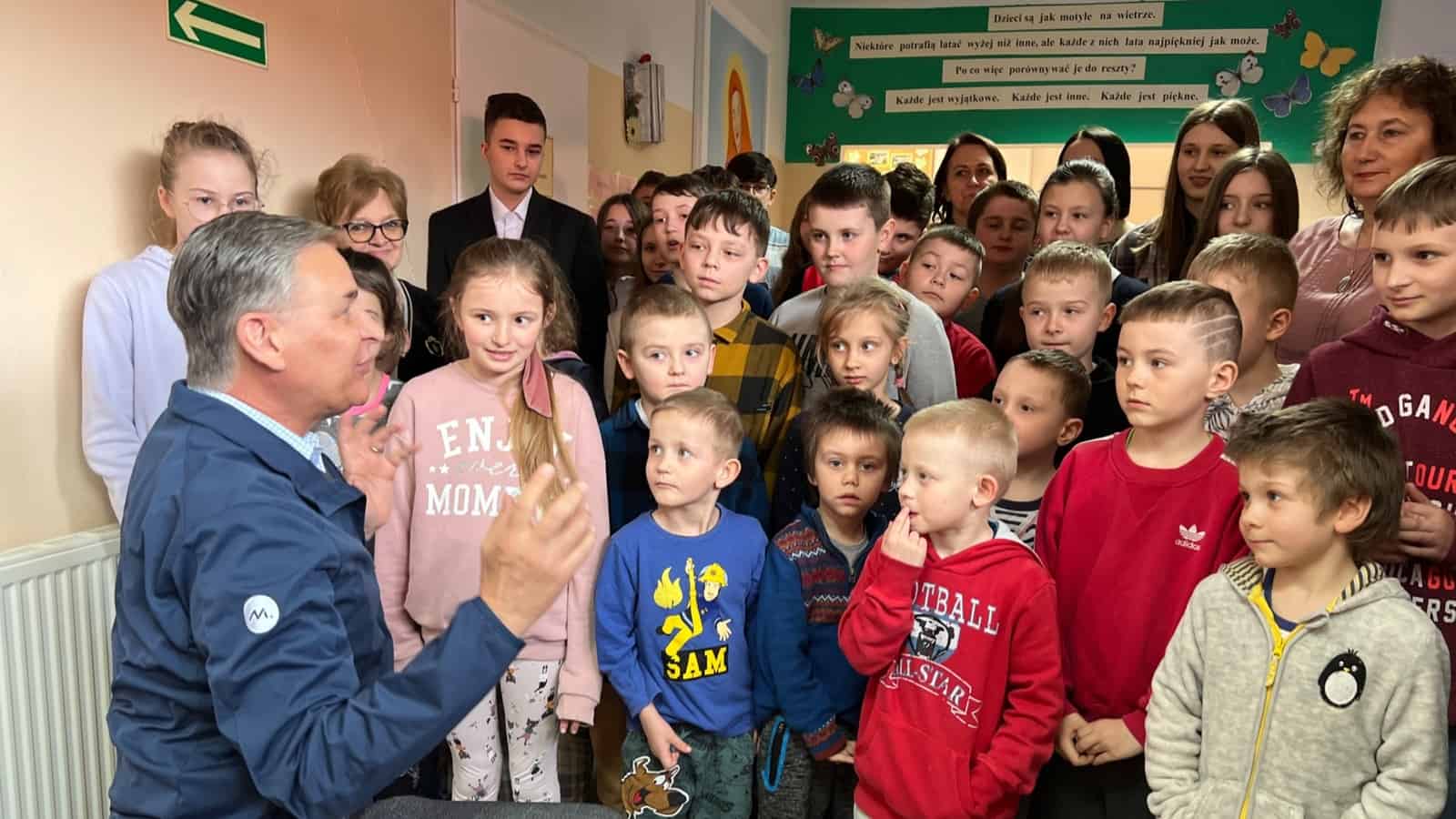
NAM President and CEO Jay Timmons concluded week one of the Competing to Win Tour in Europe by visiting a Polish school supported by UPS as well as a Pratt & Whitney facility, where he reflected on the role of manufacturing in protecting democracy.
The school: Timmons visited the elementary school in Lipa, Poland, which has been supported by UPS and served as a safe haven for Ukrainian refugee children at the start of the war.
- During his visit, Timmons discussed the needs of the children and met with the students and teachers in the town, which is near the Ukrainian border.
- He also met with an administrator from a sister school on the Ukrainian side of the border to discuss how the children there are faring.
“Arsenal of Democracy”: In addition, Timmons visited the Pratt & Whitney manufacturing campus in Rzeszów, which employs 5,000 workers and manufactures commercial and defense equipment.
- Timmons not only got a firsthand look at a company that is reinforcing the U.S.–EU commercial relationship, but also learned about the company’s response to the Ukrainian refugee crisis, which includes team members providing housing, aid and volunteer hours.
Visiting Auschwitz: Timmons visited the concentration camps at Auschwitz-Birkenau on Saturday and saw the horrific evidence of the atrocities committed at the site, where more than 1.1 million people perished.
- Following the visit, he warned against the dangers of authoritarianism and the importance of standing up for democracy and common values of respect and decency. He also noted, as highlighted during the Auschwitz-Birkenau tour, that businesses acquiesced or participated in mechanisms that advanced the aims of the Axis powers.
- Timmons emphasized manufacturing’s power to improve lives and protect freedom for people around the world. However, he also noted the dangers of command-and-control governments dictating the industry’s aims, citing the Holocaust and World War II as examples of how manufacturing can be used as a malevolent force.
The last word: “The American business community has an obligation to stand up for our democratic system and to hold our leaders responsible for their actions—and their rhetoric,” said Timmons.
- “Manufacturers in America, in particular, are a force for good. But we must never let our guard down or take our democracy for granted, no matter how difficult it may be to uphold what is right in the United States and around the world.”
Next up: The tour continues this week, with Timmons visiting high-level government and industry leaders in London, Brussels and Paris.
NAM Tour in Poland: Strengthening Democratic Ties and Supporting Ukraine’s Rebuild
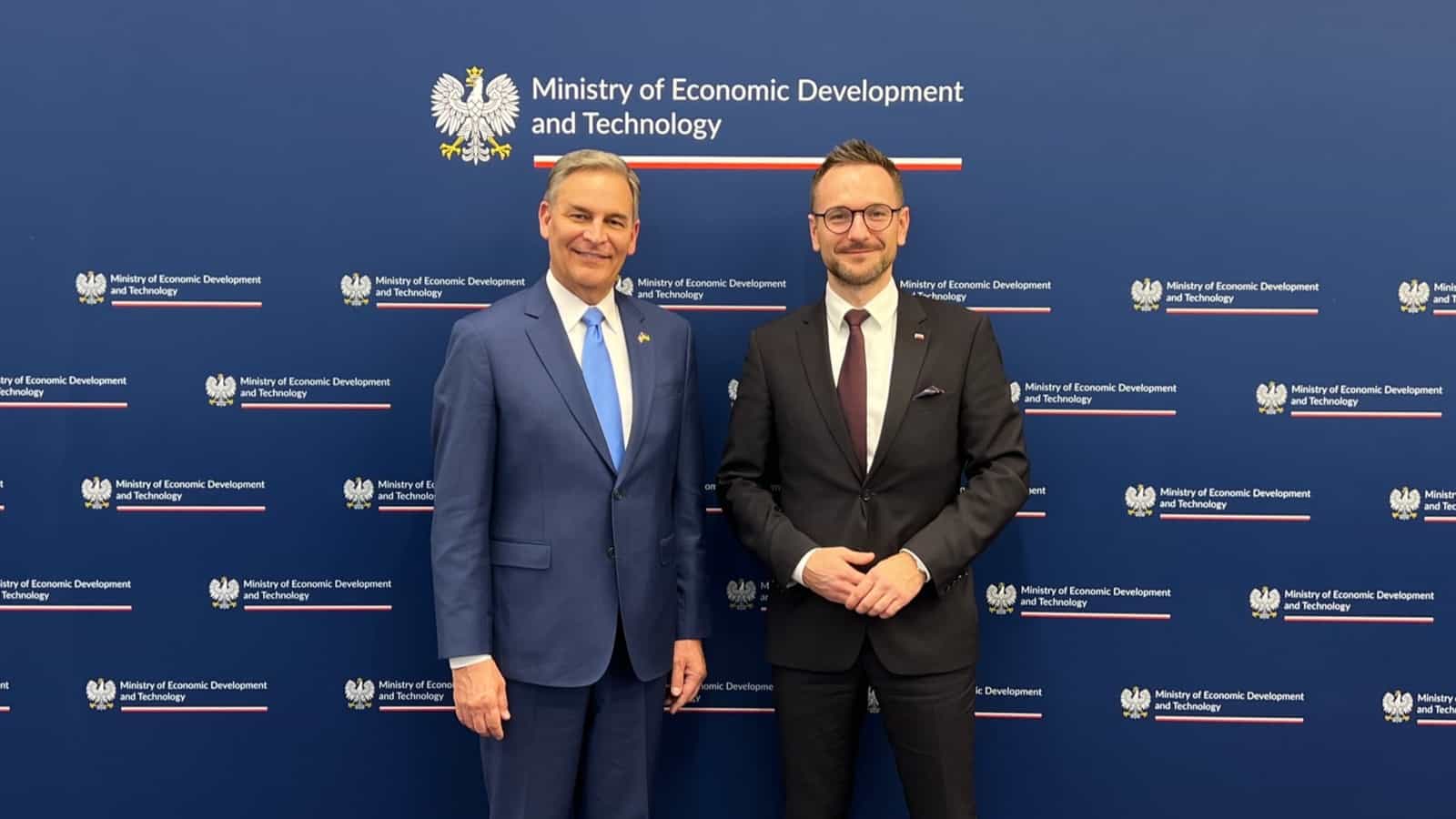
The NAM’s Competing to Win Tour in Europe continued this week with a stop in Poland, where NAM President and CEO Jay Timmons highlighted manufacturers’ support for Ukraine both in his high-level meetings and in media interviews.
Solidarity with Ukraine: At the U.S. Embassy in Warsaw, Timmons and U.S. Ambassador to Poland Mark Brzezinski met to advance manufacturers’ shared solidarity with Ukraine and the importance of strengthening U.S. commercial relationships with Poland and other democratic allies.
- During a meeting with Poland’s Minister of Economic Development and Technology Waldemar Buda, Timmons discussed the direct support and investment by U.S. manufacturers in Poland, which they can use as a base for rebuilding Ukraine after Russia’s defeat.
Humanitarian work: A visit to UPS Poland highlighted the company’s humanitarian work to support refugees from Ukraine.
- UPS has suspended operations in Russia and Belarus and has partnered with several organizations on the ground in Ukraine to provide emergency funding, in-kind support and core relief supplies to refugees.
- UPS has transported and donated millions of meals, winter coats, medical supplies, blankets and other items to aid refugees, while also providing support to its Ukrainian employees and their families.
Interview on “Morning Joe”: Live from Warsaw, Timmons appeared on “Morning Joe,” where he emphasized the power of commerce, and manufacturers, to preserve, protect and expand democracy.
- “[T]he most important thing is to support our allies that believe in democracy. I’m very concerned right now that we have a divide between democracies and authoritarian regimes,” said Timmons. “And American business, I think, can help lead the way to strengthen and support democracy.”
- “I don’t think that there’s any threat quite as grave as what we’re seeing coming out of Russia right now,” he continued. “President Xi, and his visit from China to Moscow, I think really sends a pretty big warning signal for the West.”
- The show covered Ukrainian President Zelenskyy’s recent address to the NAM Board of Directors and spotlighted the NAM’s leadership on the world stage—as well as that of individual companies.
Roundtable discussion: Timmons’ last event in Warsaw was a roundtable discussion at AmCham Poland with representatives of manufacturers in the United States that operate in Poland.
- The meeting highlighted the importance of supply chain resilience, energy security and robust, market-opening trade agreements in the work ahead in rebuilding Ukraine, which require a mobilization of capital, industry and governments not seen in Europe since 1945.
- The meeting also covered opportunities for American businesses to support Poland in these efforts and to promote democratic values.
The last word: “Forty years ago this month, President Reagan warned the world not ‘to ignore the facts of history and the aggressive impulses of an evil empire,’” said Timmons. “A [statue of President Reagan] stands across the street from the U.S. Embassy in Warsaw.”
- “As Poland generously absorbs and supports nearly 2 million Ukrainian refugees who have been displaced by Russia’s barbaric and unprovoked war, Reagan’s words are just as important today as they were then.”
